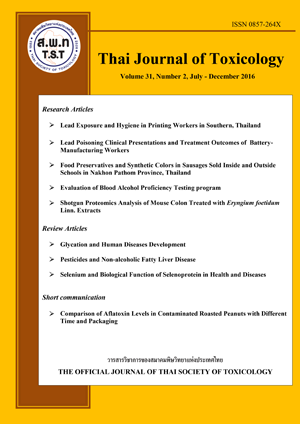Shortgun Proteomics Analysis of Mouse Colon Treated with Eryngium fotidum Linn. Extracts
Main Article Content
Abstract
Eryngium foetidum Linn.leaves (EF) have been traditionally used as a food and medicine in South East Asia. The average consumption of EF in Thai population in each age group is about 0.48 g/kg BW/day. EF was able to prevent colon carcinogenesis in mice treated with azoxymethane-dextran sulfate sodium. Moreover, there was no defect observed in colon tissues using a pathological approach. In the present study, the safety of EF at the translational level was investigated. Total proteins from 3 groups (Group 1; control group, Group 2; 0.8% EF and Group 3; 3.2% EF in diet) of each colon sample were analyzed by GeLC-MS/MS. After fractionation by SDS-PAGE, the proteins bands were divided according to their molecular weight followed by tryptic digestion and nanoLC-MS analysis. Protein quantitation and identification were determined by Decyder MS Differntial Analysis and Mascot softwares. The results showed significantly different levels of protein expression between EF-treated and non-treated mice. However, no significantly different expression was observed in 0.8% and 3.2% EF-treated mice for 15 weeks. No alteration of proteins involved in colon carcinogenesis was observed. In addition, pathological study did not showed any defect in colon tissues treated with EF. It can be concluded that the treatment with EF at 0.8% and 3.2% for 15 weeks in mice was considered as safe.


